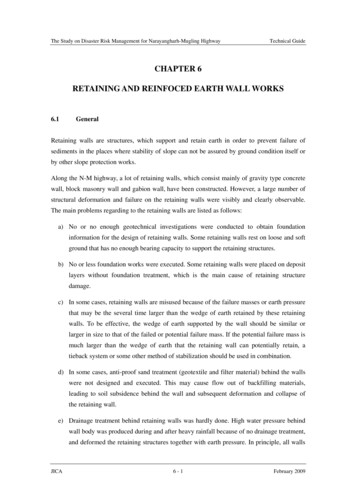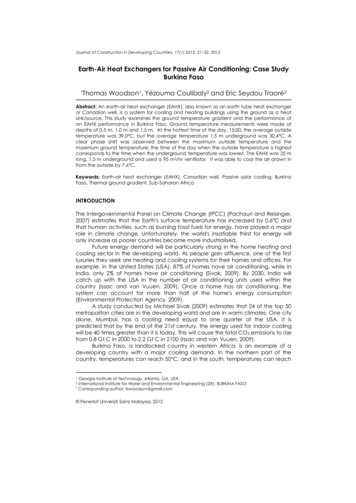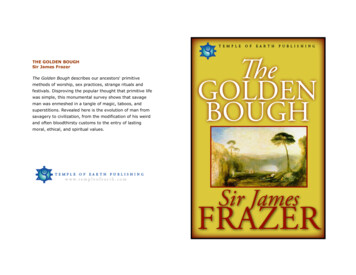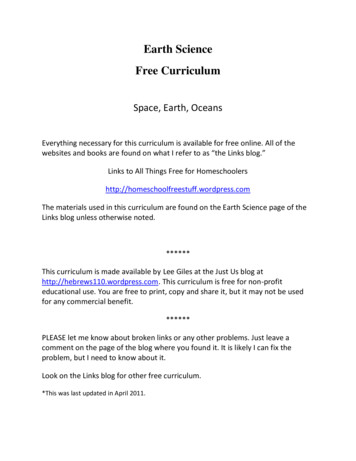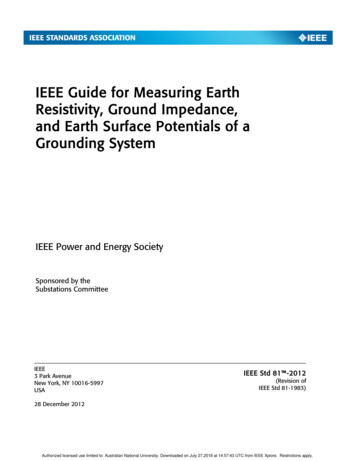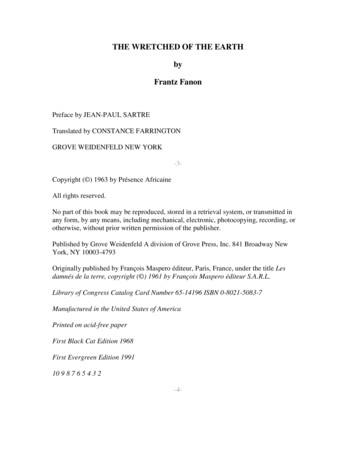
Transcription
THE WRETCHED OF THE EARTHbyFrantz FanonPreface by JEAN-PAUL SARTRETranslated by CONSTANCE FARRINGTONGROVE WEIDENFELD NEW YORK-3Copyright ( ) 1963 by Présence AfricaineAll rights reserved.No part of this book may be reproduced, stored in a retrieval system, or transmitted inany form, by any means, including mechanical, electronic, photocopying, recording, orotherwise, without prior written permission of the publisher.Published by Grove Weidenfeld A division of Grove Press, Inc. 841 Broadway NewYork, NY 10003-4793Originally published by François Maspero éditeur, Paris, France, under the title Lesdamnés de la terre, copyright ( ) 1961 by François Maspero éditeur S.A.R.L.Library of Congress Catalog Card Number 65-14196 ISBN 0-8021-5083-7Manufactured in the United States of AmericaPrinted on acid-free paperFirst Black Cat Edition 1968First Evergreen Edition 199110 9 8 7 6 5 4 3 2-4-
CONTENTSPrefaceConcerning ViolenceViolence in the International ContextSpontaneity: Its Strength and WeaknessThe Pitfalls of National ConsciousnessOn National CultureColonial War and Mental DisordersSeries ASeries BSeries CSeries CENot so very long ago, the earth numbered two thousand million inhabitants: five hundredmillion men, and one thousand five hundred million natives. The former had the Word;the others had the use of it. Between the two there were hired kinglets, overlords, and abourgeoisie, sham from beginning to end, which served as go-betweens. In the coloniesthe truth stood naked, but the citizens of the mother country preferred it with clothes on:the native had to love them, something in the way mothers are loved. The European eliteundertook to manufacture a native elite. They picked out promising adolescents; theybranded them, as with a red-hot iron, with the principles of Western culture; they stuffedtheir mouths full with high-sounding phrases, grand glutinous words that stuck to theteeth. After a short stay in the mother country they were sent home, whitewashed. Thesewalking lies had nothing left to say to their brothers; they only echoed. From Paris, fromLondon, from Amsterdam we would utter the words "Parthenon! Brotherhood!" andsomewhere in Africa or Asia lips would open ".thenon! .therhood!" It was the goldenage.It came to an end; the mouths opened by themselves; the yellow and black voices stillspoke of our humanism-7but only to reproach us with our inhumanity. We listened without displeasure to thesepolite statements of resentment, at first with proud amazement. What? They are able totalk by themselves? Just look at what we have made of them! We did not doubt but thatthey would accept our ideals, since they accused us of not being faithful to them. Then,indeed, Europe could believe in her mission; she had hellenized the Asians; she hadcreated a new breed, the Greco-Latin Negroes. We might add, quite between ourselves,as men of the world: "After all, let them bawl their heads off, it relieves their feelings;dogs that bark don't bite."
A new generation came on the scene, which changed the issue. With unbelievablepatience, its writers and poets tried to explain to us that our values and the true facts oftheir lives did not hang together, and that they could neither reject them completely noryet assimilate them. By and large, what they were saying was this: "You are making usinto monstrosities; your humanism claims we are at one with the rest of humanity butyour racist methods set us apart." Very much at our ease, we listened to them all; colonialadministrators are not paid to read Hegel, and for that matter they do not read much ofhim, but they do not need a philosopher to tell them that uneasy consciences are caughtup in their own contradictions. They will not get anywhere; so, let us perpetuate theirdiscomfort; nothing will come of it but talk. If they were, the experts told us, asking foranything at all precise in their wailing, it would be integration. Of course, there is noquestion of granting that; the system, which depends on overexploitation, as you know,would be mined. But it's enough to hold the carrot in front of their noses, they'll gallop allright. As to a revolt, we need not worry at all; what native in his senses would go off tomassacre the fair sons of Europe simply to become European as-8they are? In short, we encouraged these disconsolate spirits and thought it not a bad ideafor once to award the Prix Goncourt to a Negro. That was before '39.1961. Listen: "Let us waste no time in sterile litanies and nauseating mimicry. Leave thisEurope where they are never done talking of Man, yet murder men everywhere they findthem, at the corner of every one of their own streets, in all the corners of the globe. Forcenturies they have stifled almost the whole of humanity in the name of a so-calledspiritual experience." The tone is new. Who dares to speak thus? It is an African, a manfrom the Third World, an ex-"native." He adds: " Europe now lives at such a mad,reckless pace that she is running headlong into the abyss; we would do well to keep awayfrom it." In other words, she's done for. A truth which is not pleasant to state but of whichwe are all convinced, are we not, fellow-Europeans, in the marrow of our bones?We must however make one reservation. When a Frenchman, for example, says to otherFrenchmen, "The country is done for"--which has happened, I should think, almost everyday since 1930--it is emotional talk; burning with love and fury, the speaker includeshimself with his fellowcountrymen. And then, usually, he adds, "Unless." His meaningis clear; no more mistakes must be made; if his instructions are not carried out to theletter, then and only then will the country go to pieces. In short, it is a threat followed bya piece of advice and these remarks are so much the less shocking in that they springfrom a national intersubjectivity. But on the contrary, when Fanon says of Europe thatshe is rushing to her doom, far from sounding the alarm he is merely setting out adiagnosis. This doctor neither claims that she is a hopeless case -miracles have beenknown to exist--nor does he give her the means to cure herself. He certifies that she isdying, on external evidence, founded on symptoms that he can-9-
observe. As to curing her, no; he has other things to think about; he does not give a damnwhether she lives or dies. Because of this, his book is scandalous. And if you murmur,jokingly embarrassed, "He has it in for us!" the true nature of the scandal escapes you; forFanon has nothing in for you at all; his work--red-hot for some--in what concerns you isas cold as ice; he speaks of you often, never to you. The black Goncourts and the yellowNobels are finished; the days of colonized laureates are over. An ex-native, Frenchspeaking, bends that language to new requirements, makes use of it, and speaks to thecolonized only: "Natives of all underdeveloped countries, unite? What a downfall! Forthe fathers, we alone were the speakers; the sons no longer even consider us as validintermediaries: we are the objects of their speeches. Of course, Fanon mentions inpassing our well-known crimes: Sétif, Hanoi, Madagascar: but he does not waste his timein condemning them; he uses them. If he demonstrates the tactics of colonialism, thecomplex play of relations which unite and oppose the colonists to the people of themother country, it is for his brothers; his aim is to teach them to beat us at our own game.In short, the Third World finds itself and speaks to itself through his voice. We know thatit is not a homogeneous world; we know too that enslaved peoples are still to be foundthere, together with some who have achieved a simulacrum of phony independence,others who are still fighting to attain sovereignty and others again who have obtainedcomplete freedom but who live under the constant menace of imperialist aggression.These differences are born of colonial history, in other words of oppression. Here, themother country is satisfied to keep some feudal rulers in her pay; there, dividing andruling she has created a native bourgeoisie, sham from beginning to end; elsewhere shehas played a double game: the-10colony is planted with settlers and exploited at the same time. Thus Europe has multiplieddivisions and opposing groups, has fashioned classes and sometimes even racialprejudices, and has endeavored by every means to bring about and intensify thestratification of colonized societies. Fanon hides nothing: in order to fight against us theformer colony must fight against itself: or, rather, the two struggles form part of a whole.In the heat of battle, all internal barriers break down; the puppet bourgeoisie ofbusinessmen and shopkeepers, the urban proletariat, which is always in a privilegedposition, the lumpenproletariat of the shanty towns--all fall into line with the stand madeby the rural masses, that veritable reservoir of a national revolutionary army; for in thosecountries where colonialism has deliberately held up development, the peasantry, when itrises, quickly stands out as the revolutionary class. For it knows naked oppression, andsuffers far more from it than the workers in the towns, and in order not to die of hunger, itdemands no less than a complete demolishing of all existing structures. In order totriumph, the national revolution must be socialist; if its career is cut short, if the nativebourgeoisie takes over power, the new state, in spite of its formal sovereignty, remains inthe hands of the imperialists. The example of Katanga illustrates this quite well. Thus theunity of the Third World is not yet achieved. It is a work in progress, which begins by theunion, in each country, after independence as before, of the whole of the colonizedpeople under the command of the peasant class. This is what Fanon explains to his
brothers in Africa, Asia, and Latin America: we must achieve revolutionary socialism alltogether everywhere, or else one by one we will be defeated by our former masters. Hehides nothing, neither weaknesses, nor discords, nor mystification. Here, the movementgets off to a bad start; there, after a striking initial success it loses momentum;-11elsewhere it has come to a standstill, and if it is to start again, the peasants must throwtheir bourgeoisie overboard. The reader is sternly put on his guard against the mostdangerous will o' the wisps: the cult of the leader and of personalities, Western culture,and what is equally to be feared, the withdrawal into the twilight of past African culture.For the only true culture is that of the revolution; that is to say, it is constantly in themaking. Fanon speaks out loud; we Europeans can hear him, as the fact that you hold thisbook in your hand proves; is he not then afraid that the colonial powers may takeadvantage of his sincerity?No; he fears nothing. Our methods are out-of-date; they can sometimes delayemancipation, but not stop it. And do not think that we can change our ways; neocolonialism, that idle dream of mother countries, is a lot of hot air; the "Third Forces"don't exist, or if they do they are only the tin-pot bourgeoisies that colonialism hasalready placed in the saddle. Our Machiavellianism has little purchase on this wideawake world that has run our falsehoods to earth one after the other. The settler has onlyrecourse of one thing: brute force, when he can command it; the native has only onechoice, between servitude or supremacy. What does Fanon care whether you read hiswork or not? It is to his brothers that he denounces our old tricks, and he is sure we haveno more up our sleeves. It is to them he says: "Europe has laid her hands on ourcontinents, and we must slash at her fingers till she lets go. It's a good moment; nothingcan happen at Bizerta, at Elizabethville or in the Algerian bled * that the whole worlddoes not hear about. The rival blocs take opposite sides, and hold each other in check; letus take advantage of this paralysis, let us burst into history, forcing*Up-country in North Africa.--Trans.-12it by our invasion into universality for the first time. Let us start fighting; and if we've noother arms, the waiting knife's enough."Europeans, you must open this book and enter into it. After a few steps in the darknessyou will see strangers gathered around a fire; come close, and listen, for they are talkingof the destiny they will mete out to your trading centers and to the hired soldiers whodefend them. They will see you, perhaps, but they will go on talking among themselves,without even lowering their voices. This indifference strikes home: their fathers, shadowycreatures, your creatures, were but dead souls; you it was who allowed them glimpses oflight, to you only did they dare speak, and you did not bother to reply to such zombies.
Their sons ignore you; a fire warms them and sheds light around them, and you have notlit it. Now, at a respectful distance, it is you who will feel furtive, nightbound, andperished with cold. Turn and turn about; in these shadows from whence a new dawn willbreak, it is you who are the zombies.In this case, you will say, let's throw away this book. Why read it if it is not written forus? For two reasons: the first is that Fanon explains you to his brothers and shows themthe mechanism by which we are estranged from ourselves; take advantage of this, and getto know yourselves seen in the light of truth, objectively. Our victims know us by theirscars and by their chains, and it is this that makes their evidence irrefutable. It is enoughthat they show us what we have made of them for us to realize what we have made ofourselves. But is it any use? Yes, for Europe is at death's door. But, you will say, we livein the mother country, and we disapprove of her excesses. It is true, you are not settlers,but you are no better. For the pioneers belonged to you; you sent them overseas, and itwas you they enriched. You warned them-13that if they shed to
created a new breed, the Greco-Latin Negroes. We might add, quite between ourselves, . his book is scandalous. And if you murmur, jokingly embarrassed, "He has it in for us!" the true nature of the scandal escapes you; for Fanon has nothing in for you at all; his work--red-hot for some--in what concerns you is as cold as ice; he speaks of you often, never to you. The black Goncourts and the .

